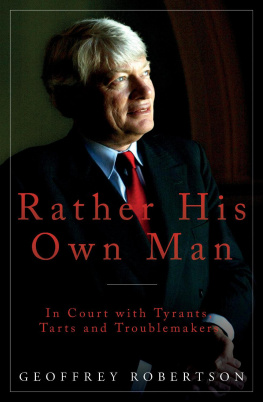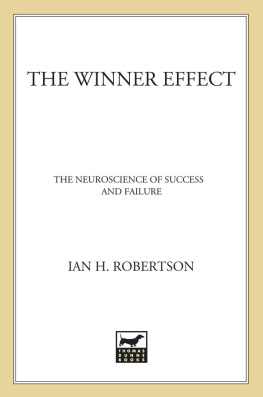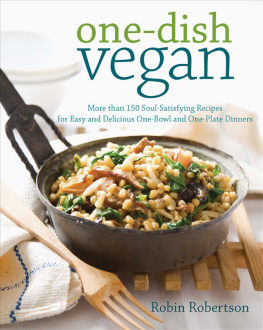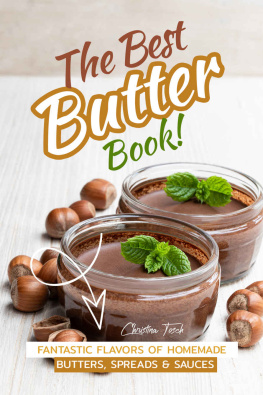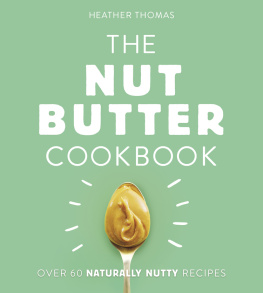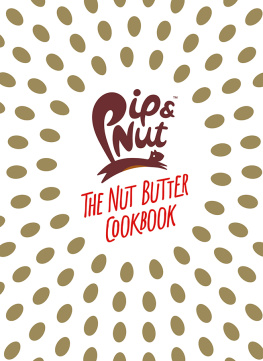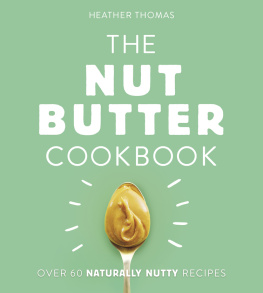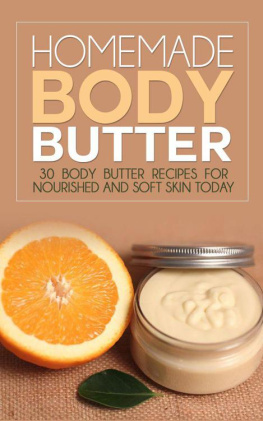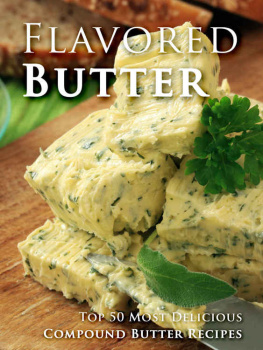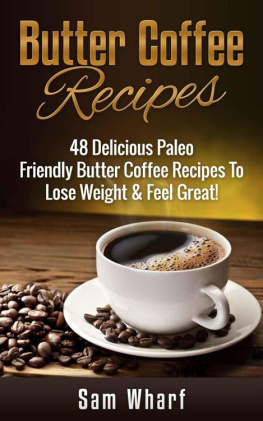RAVES FOR THE NUT BUTTER COOKBOOK
Robin Robertsons cookbook is so unique and creative youll want to test every decadent recipe. Its hard to know where to begin with these insanely delicious choices, from Peruvian Peanut Potato Soup and Linguine with Thai Pesto to Peanut Butter Cups and Pineapple Coconut Cheesecake.
Julieanna Hever, The Complete Idiots Guide to Plant-Based Nutrition
If you think nut butters are just for sandwiches, get ready to expand your horizons with The Nut Butter Cookbook by Robin Robertson. This vegan cookbook proclaims the versatility of peanut, almond, cashew, sesame, and other nut and seed butters for every meal of the day. The butters in these recipes are also interchangeable, so those who are allergic to some, but not all, nuts and seeds can still benefit. Most recipes require only a small amount of nut or seed butter to lend rich flavor and protein.
Emily Ho, theKitchn.com
In a dairy-free kitchen, nut butters are often the rich, creamy answer to that craving that might once have been met by cheese. And according to Robertsons introduction to the book, we would all do well to eat more nut butters for health. Packed with antioxidants, good fats, and, of course, healthy proteins, nut butters are a real nutritional powerhouse.
Robin Asbell, Big Vegan
This collection of recipes shows how to use nut butters to create soup, main dishes, and desserts. If youve got a from-scratch sensibility and a good food processor, you can make your own nut butters to create a homemade foundation for everything from waffles to stuffed peppersand yes, nut butter sandwiches. The three-ingredient homemade nut butter recipe is a revelation.
Grant Butler, The Oregonian
Think nut butter the next time you want to add extra flavor and nutrition to your cooking.
Nava Atlas, VegKitchen.com
The book is bursting with recipes putting this wonderful kitchen staple to good use. There are recipes calling for every type of nut butter you can imagine, but dont be worried about trying to hunt them down in the storeRobin provides an overview on how to make basic nut butters as well as other uses for nuts, like cashew cream or nut-based mayo.
Kristy Turner, KeepinItKind.com
the
NUT BUTTER
COOKBOOK
ALSO BY ROBIN ROBERTSON
Hot Vegan
Vegan Without Borders
Quick-Fix Vegan
More Quick-Fix Vegan
Quick-Fix Vegetarian
Vegan Planet
One-Dish Vegan
Fresh from the Vegan Slow Cooker
Party Vegan Vegan
on the Cheap
1,000 Vegan Recipes
Vegan Unplugged (co-author)
The Vegetarian Meat and Potatoes Cookbook
the
NUT BUTTER
COOKBOOK
100 delicious vegan recipes made better with nut butter

ROBIN ROBERTSON

TO MY FAMILY:
JON, GARY, MITZKI, JASON,
AND PETEY
CONTENTS
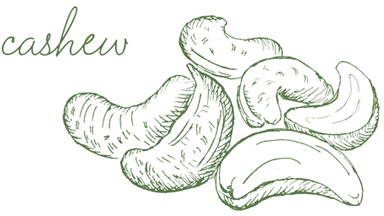
FOREWORD
BY JULIEANNA HEVER, MS, RD, CPT
I grew up in a completely nut-free household, because my father is allergic to most nuts. We couldnt have nuts anywhere in the house. Once I moved out and was on my own, I slowly began a new journey into an entirely new genre of flavor and texture I had never been privy to. A new world opened up to me as I explored various nuts and nut butters, testing them in recipes and adding them to snacks, recognizing how much I had been missing throughout my youth. Because of my newness to this class of versatile plant-based foods, I am all the more grateful to Robin for creating this gem of a book, enabling me to explore her fresh concepts and ideas, and to indulge in these nutritious and delicious recipes. The Nut Butter Cookbook is brimming with creativity, great flavor, and decadence, all the while providing enticing ways to incorporate health-filled nut butters into your daily fare.
Nuts and seeds have been a traditional component of most cultures for millennia. Not only are they delicious and provide delectable additions to a vast variety of dishes, but they also boast extraordinary nutrient profiles and have been associated with multiple health benefits in the scientific literature.
Tree nuts and peanuts (technically a legume masquerading as a nut, thanks to the nomenclature and nutrient profile) are rich in vitamins E, B6, folate, thiamin, riboflavin, niacin, pantothenic acid, and much-needed minerals like calcium, selenium, iron, zinc, manganese, magnesium, phosphorus, and potassium. They score high on antioxidant ranking systems and provide a plethora of protective phytonutrients. Seeds, too, provide a wealth of nutrients including vitamin E and several from the B complex (namely, thiamine, niacin, folate, and B6), manganese, tryptophan, calcium, phosphorus, potassium, zinc, and iron. Special super stars of the seed kingdom are sesame seeds and tahini (sesame seed butter) due to their healthy dose of calcium, and chia, flax, and hemp seeds for their abundance of plant-based omega-3 fats.
Although the percentage of calories in nuts and seeds is high in total fat, their fatty acid profile is optimal, made up of primarily monounsaturated fats (although certain nuts like walnuts are predominantly polyunsaturated). Overall, nuts are lower in artery-clogging saturated fats and do not contain nefariously problematic trans fatty acids or dietary cholesterol. Some nuts and seeds are high in the essential polyunsaturated omega-3 fatty acid, alpha-linolenic acid (ALA). In fact, it only takes approximately half a cup of black walnuts, two tablespoons of English walnuts, or one tablespoon of flaxseeds, hemp seeds, or chia seeds to provide the daily Adequate Intake (AI) of ALA. In a vegan diet, these are your best options for attaining your omega-3 fatty acids, and should be considered a consistent component of your meal plan. Robin illustrates some easy and delicious ways of enjoying them throughout this book.
Another unique contribution nuts provide is phytosterols, plant-derived sterols and stanols, which have been associated with cholesterol-optimizing effects as well as lowered risk for certain cancers. Nuts also contain ellagic acid, a potent antioxidant, as well as lignans, which have antioxidant and phytoestrogenic properties. These compounds have been shown to support heart health and protect against certain cancers.
Nuts are an excellent source of healthy plant protein. The biggest benefit of consuming protein from nuts and other plant foods is that it is packaged alongside all of these other wonderful nutrients and yet do not contain harmful steroids, hormones, cholesterol, and saturated fats found in animal products. In fact, the protein content in nuts and seeds helps provide essential amino acids and boost protein intake in a vegan diet. And here is a bonus: L-arginine, one of the amino acids found abundantly in nuts, is the precursor to nitric oxide and its consumption can help improve blood flow by enhancing vasodilation (Brufau, et al, Brit J Nutr, 2006). for an illustration of the varied and health-promoting fatty acid profile, and generous fiber and phytosterol content of various nuts and peanuts.
In recent years, research has shed light on numerous compelling benefits of consuming nuts and seeds regularly. Epidemiological data have revealed that nuts appear to reduce your risk of cardiovascular disease, the number one killer of Americans, by approximately one-third or more. The Nurses Health Study is a prospective cohort study that began following 121,700 female nurses in 1976. In a recent analysis (Baer, et al,
Next page


